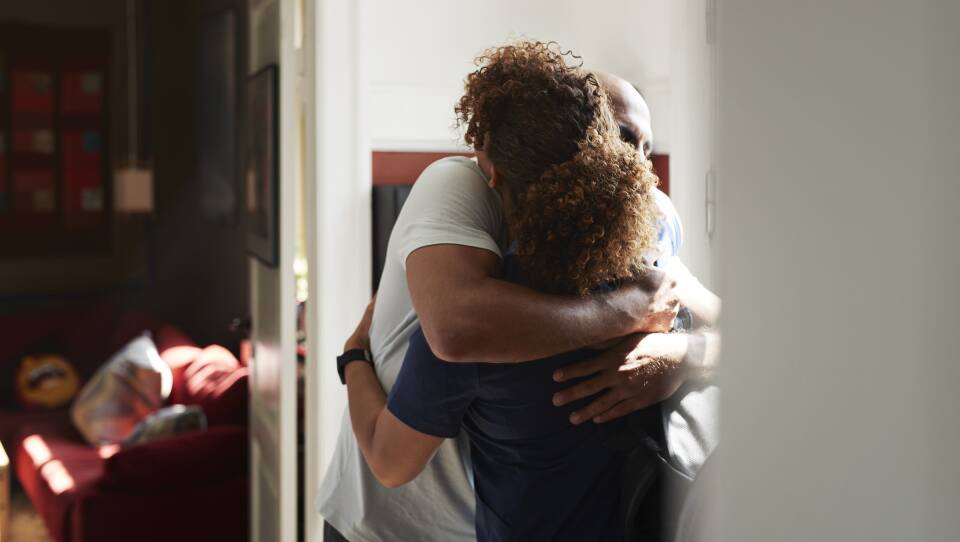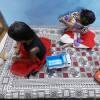A recent report from the Boston Foundation found that as our population steadily ages, there's an increasing demand for care workers. The caregiving industry is one of the fastest growing sectors of the state's economy and largely employs immigrant women and women of color. But it's also made up of family members and friends caring for their loved ones. Mindy Fried, host of the podcast “The Shape of Care” joined GBH’s Morning Edition hosts Paris Alston and Jeremy Siegel to discuss the caregiving crisis. This transcript has been lightly edited.
Paris Alston: Mindy, give us a peek into your world and your relationship to caregiving. Why did you want to start this podcast?
Mindy Fried: I'll have to kind of roll it back to my own personal experience caring for my father, which my sister and I shared for about a year and a half. He died five days short of 98 years old. In his last couple of years, he was really struggling. And we had a lot of really difficult decisions to make. It was a powerful experience. I'm a sociologist by training, and I experienced kind of being in the experience as well as kind of observing it and trying to understand what it meant.
So I ended up writing a memoir about caring for him called “Caring for Red: A Daughter's Memoir,” and did a lot of touring around the country and talking to people and hearing their stories. And, you know, I kind of got sick of talking about my own story. I was really fascinated with other people's stories and realized that there were a lot of universal issues that people were talking about, and yet people were really isolated in their own experience and struggling to navigate the whole caregiving landscape.
Jeremy Siegel: Season one of your podcast explored caregiving during the pandemic. How did we see the pandemic affect caregivers?
Fried: The impact of the pandemic was just so powerful and devastating. So I ended up interviewing people who were essential workers, global researchers who were looking at the impact of the pandemic all over the world, and also people who were running programs to try and respond to the need.
Alston: Season two, which is out now, really connects care workers to the policies that govern the caregiving industry. And thus far, those things have been sort of disconnected.
Fried: I had a lot of time to think about what I wanted to do next with season two. And I think one thing that struck me the most profoundly was that caregiving is about relationships. It's about the relationship between the person who's caring for somebody and the person who's receiving that care. It's about the relationship of care workers and the system in which they work. Meaning, if it's an employer or if they're an independent caregiver and trying to struggle through all the decision making there. And then it's also a relationship between the caregiving landscape in the context of policy issues. So I really wanted to be able to connect personal stories with the broader picture, looking at some of the policy issues that were impacting people on the ground.
"We are not ready ... We currently have a very fragmented system of care policy. People who need care struggle to navigate that system."-Mindy Fried, host of "The Shape of Care"
Siegel: I want to cite some statistics that appear on your podcast. One of them is how 41 million people are caregiving on an informal or family basis. So not just people using professional caregivers, but people helping family members. And 60% of them are also employed full time or part time. About one in four of them are millennials or younger. And you also say on the show that the population of people who depend on caregiving is expected to skyrocket over the next ten years. Are we prepared for this rise in demand, especially when you consider how many people who would be taking on this responsibility have jobs of their own?
Fried: No, we are not ready. We currently have a very fragmented system of care policy. People who need care struggle to navigate that system. The main funding for care is Medicaid, which goes primarily for nursing homes. And then there's this really complicated system, state by state, in which people can request waivers to use Medicaid money for home care. You know, home care is what people prefer, and nobody wants to go into a nursing home. That's not how we see ourselves in the future.
The funding is not there. There's a lot of resistance within the policy circles, especially among Republicans, to be frank, against increasing funding for Medicaid. It's really a crisis of care, as some people used to call it, a 2030 problem, meaning that we were going to hit this wall in 2030. And I think that we can now kind of roll back when the crisis is hitting. We're seeing it coming. It's rolling. We need to do something about it.
Alston: So, Mindy, I mentioned at the top, right, we're all aging in place. We will be at this point, at some point in our lives, where we are going to need someone to care for us. When you talk about the sort of nearsightedness of how our policies have been formed around this industry, do you think that we have lost sight of the fact that we are all going to end up needing this industry at some point in our lives? And how would you like to see that shift?
Fried: I think that one of the things that we're living with within our culture is ageism. That affects us at all levels. If you look at the commercialization of growing older, it's kind of crazy. You know, dye your hair, get rid of your wrinkles, don't have those saggy breasts, all those things that are considered verboten. You know, maintain engagement, stay super active. All those things are valued. And so we live very much still in a youth oriented culture from a commercial perspective. And yet the reality is that, as people get older, not everybody struggles with disabilities, but once you hit your eighties, the likelihood of having some kind of disability increases and we don't have the acceptance within this culture to just see that as is a normal part of aging.









